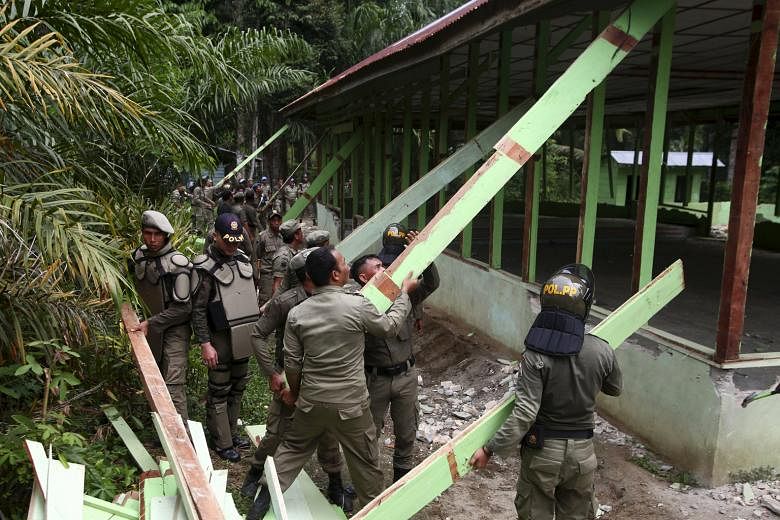SINGKIL (Indonesia) • When a mob of Muslims swooped down on a little church deep in rural Aceh this month, local police were nowhere to be seen, although they had received warnings of a possible attack.
When they did arrive, the police were mostly unarmed and outnumbered by hundreds of activists from the hardline Islamic Defenders Front (FPI) group and others who burnt the rickety church down.
The FPI made no apology for the incident, saying the authorities had ignored repeated complaints about churches and makeshift altars that have popped up without permits in Aceh Singkil, a district in the most conservative province of this Muslim-majority country.
In the wake of the attack, the authorities gave in to the FPI's demands, and used sledgehammers and axes to demolish 10 other churches in the area that lacked proper permits. The national police chief later said intelligence reports that such an attack was being planned had been received.
The raid and the aftermath reflect an increasingly militant attitude towards other faiths in Aceh, where syariah law now requires non-Muslims to abide by rules forbidding extramarital sex, homosexual relationships and public displays of affection.
Analysts say the FPI and similar hardline groups, emboldened by government inaction, are using legal pretexts to undermine Christians, Hindus and smaller Islamic sects.
"These churches have been mushrooming for years and the Christians are violating laws because they don't have permits," said chief of FPI's Aceh chapter Muslim Al Thahiry.
Residents of Aceh Singkil say the number of non-Muslims there has swelled in recent years because of migrants from neighbouring North Sumatra, where Christians make up a third of the population, looking for work in oil palm plantations.
Census data shows the Christian community in Aceh Singkil has nearly doubled from about 6,500 at the turn of the century, when they made up 6 per cent of the population. Today, over 11 per cent is Christian, although the overall population of the district has remained static at about 100,000.
Religious Affairs Minister Lukman Hakim Saifuddin acknowledged in an interview with Reuters that the future of Indonesia's minorities could be "fragile".
"These conflicts should be resolved with dialogue... and without causing losses to any side, by which we mean everybody's rights should be upheld," he said.
The FPI has protested, at times violently, around the country since its creation in 1999: against mosques belonging to the Ahmadiyah sect of Islam, against religious events marked by the minority Shi'ite Muslim community, and even against the capital Jakarta's Christian governor. With a membership of seven million, FPI is small compared with Indonesia's biggest Islamic group, the moderate Nahdlatul Ulama, which has about six times as many members.
But Dr Ian Wilson of Murdoch University says the government's failure to rein in radical Islam leaves religious minorities vulnerable.
"Nobody is willing to stand up to it because of the political risk of being branded anti-Islam," he said.
REUTERS

